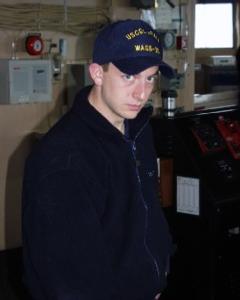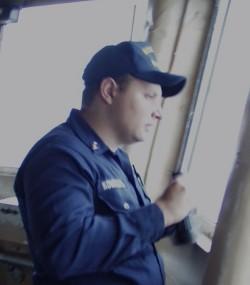
|
|
15 June, 2000
15 June 2000
Coast Guard Academy - Education With A Future
Many people are familiar with Annapolis, West Point, even the Air Force
Academy, but not as many are aware that an excellent education is available
to those willing to take the challenge of attending the Coast Guard Academy
in New London, CT.
I’d like to introduce two cadets serving on the USCGC Healy who made that
choice and have just completed their junior year at the Academy.
Cadet David Kowalczyk of Wilbraham, MA is a Mechanical Engineering major
who chose the Coast Guard in part due to its impressive service history, the
great stories he heard during visits, the opportunity for a free, top-notch
education, and the guaranteed job after graduation. He also was thrilled
with the opportunities for travel.
After visiting West Point as a child, Cadet Paul Mangini, a Marine Science
major from West Springfield, MA, became impressed with the history of
service academies. Preparing for an academy became the focus of his next
seven years of school. The Coast Guard showed considerable interest in Paul
his senior year and he even had coaches calling him asking to play sports at
the Academy.
Parcticipation in athletics is mandatory for all cadets. Paul is on the
hockey team and plays three other intramural sports, while David throws the
hammer for the track squad and is also on the crew team. Athletics provides
some much needed stress relief for the rigorous academic demands of the
Coast Guard Academy. As freshmen, David and Paul both completed 40 semester
credit of courses. In many colleges, 30 credits would be about standard for
freshmen. The first year is well rounded with a collection of core courses
including English, Math, History, Ethics, and Nautical Science. After a
year of core courses, cadets begin to choose areas of specialization in
which to major, all of which are math intensive. This well-rounded
educational process aids the Academy as it strives to produce highly
qualified leaders for duty as officers in the United States Coast Guard.
After their junior year, cadets are posted to a vessel for ten weeks. David
and Paul were excited when they learned they were to be stationed aboard the
HEALY. They both pointed out how technically advanced this ship is - “the
most advanced of any U.S. flagged vessel…a glimpse into the future…”
according to David. Paul pointed out that it is so advanced it can function
well with an optimally manned crew (fewer crew than historically stationed
on ships). They were also thrilled with the travel - Greenland, Iceland,
Ireland, Alaska, and the Northwest Passage. These are places few 21 year
olds are able to travel to, especially in one trip!
How does the rest of the schooling compare to a more typical four-year
college? The program is definitely more regimented and military oriented.
Cadets must meet and maintain standards for uniforms, grooming, and rooms.
Who monitors these standards? The cadets themselves do. Juniors are
responsible for freshmen. Sophomores sort of take care of themselves.
Seniors have various leadership positions if they have shown they are ready
to lead - both Paul and David have done so and will assume those
responsibilities next year. Officers at the school act as mentors for the
entire Academy. In a school of 800-900 students everyone knows everyone
else, including the instructors. In classes of 4-20, the instructors know
every student’s name and are great about providing individual attention and
helping out those that are working hard. This is a definite improvement
over some major colleges where in a classroom of 300 or more students you
are lucky if a teaching assistant knows your name. David and Paul also
point out that students in their classes are among the tops in the country.
Usually students accepted to the Academy are among the top 5-10% of their
high school class. This creates a challenging, but stimulating environment
in each and every course. The end result, as both cadets point out, is a
top-notch education with exciting opportunities waiting for an Academy
graduate as an Officer in the United States Coat Guard.
Note: Justice has been served. While my students were taking their last
final exam today, I was taking a test as well!!! Todd and I had to take a
test on incinerator operation so we can take care of the garbage for the
science contingent. Yes, we both passed.

Cadet Paul Mangini at his watch on the bridge of the HEALY.

Cadet David Kowalczyk watches for icebergs on the HEALY's bridge.
Contact the TEA in the field at
.
If you cannot connect through your browser, copy the
TEA's e-mail address in the "To:" line of
your favorite e-mail package.
|
